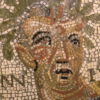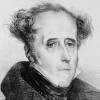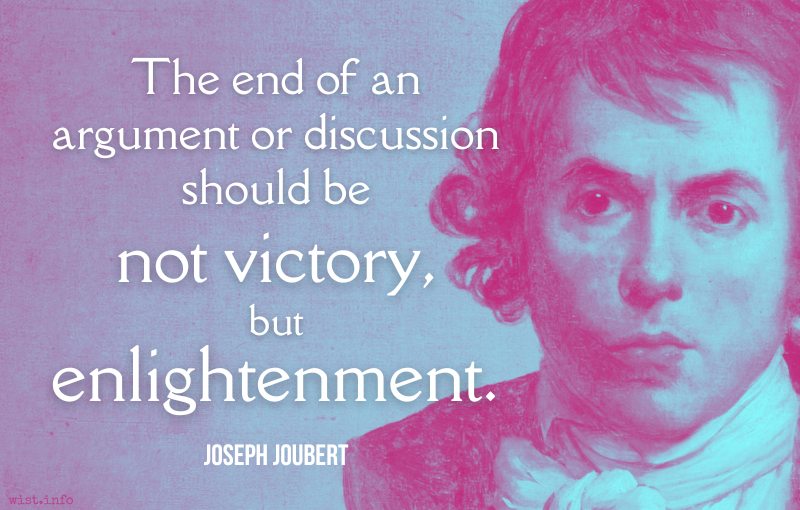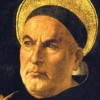You are the sun who heals all clouded sight.
Solving my doubts, you bring me such content
That doubt, no less than knowing, is delight.[O sol che sani ogne vista turbata,
tu mi contenti sì quando tu solvi,
che, non men che saver, dubbiar m’aggrata.]Dante Alighieri (1265-1321) Italian poet
The Divine Comedy [Divina Commedia], Book 1 “Inferno,” Canto 11, l. 91ff (11.91-93) [Dante] (1309) [tr. Kirkpatrick (2006)]
(Source)
Flattering Virgil before he asks another question. (Source (Italian)). Alternate translations:
O you, who like the Sun each weaken'd sight
Relieve, and give such pleasure when you clear
My doubts, that I to raise them oft desire.
[tr. Rogers (1782), l. 89ff]
Can I repent my doubts! illumin'd Bard,
When thus thy heav'nly words my doubts reward?
[tr. Boyd (1802), st. 14]
O Sun! who healest all imperfect sight,
Thou so content’st me, when thou solv’st my doubt,
That ignorance not less than knowledge charms.
[tr. Cary (1814)]
O Sun, that healest every troubled sight!
So full content, thou solving, doth ensue,
Glads me no less to doubt, than judge aright.
[tr. Dayman (1843)]
O Sun! who healest all troubled vision, thou makest so glad when thou resolvest me, that to doubt is not less grateful than to know.
[tr. Carlyle (1849)]
Thou sun, that clearest every clouded sight,
You so content me to dissolve the knot,
To know is scarce so pleasing as to doubt.
[tr. Bannerman (1850)]
Oh, sun! thou healer of the troubled sight,
What thou declarest makes me so content,
That as in knowledge I rejoice in doubt.
[tr. Johnston (1867)]
O Sun, that healest all distempered vision,
Thou dost content me so, when thou resolvest,
That doubting pleases me no less than knowing!
[tr. Longfellow (1867)]
O Sun that healest every troubled sight, so dost thou content me when thou solvest, that doubting gives me no less pleasure than knowing.
[tr. Butler (1885)]
O Sun, that healest every troubled sight.
Thou so contentest me when thou mak'st clear
Doubts, that no less than knowledge they delight.
[tr. Minchin (1885)]
O Sun that healest every troubled vision, thou dost content me so, when thou explainest, that doubt, not less than knowledge, pleaseth me.
[tr. Norton (1892)]
O sun, that bringest healing unto all clouded vision, thou grantest unto me such satisfaction in thine unravelling, that doubting doth delight me.
[tr. Sullivan (1893)]
Oh! sun, who makest whole all troubled vision.
Thou dost content me so when thou resolvest
That doubt is joy to me, no less than knowledge.
[tr. Griffith (1908)]
O Sun that healest all troubled sight, so dost thou satisfy me with the resolving of my doubts that it is no less grateful to me to question than to know.
[tr. Sinclair (1939)]
O Sun, who heal'st all troubled vision, and so
Contentest me where thou doest certify,
That to doubt pleaseth not less than to know ....
[tr. Binyon (1943)]
O Sun that healest all dim sight, thou so
Doest charm me in resolving of my doubt,
To be perplexed is pleasant as to know.
[tr. Sayers (1949)]
O sun which clears all mists from troubled sight,
such joy attends your rising that I feel
as grateful to the dark as to the light.
[tr. Ciardi (1954)]
O sun that heal every troubled vision, you do content me so, when you solve, that questioning, no less than knowing, pleases me.
[tr. Singleton (1970)]
O sun that shines to clear a misty vision,
such joy is mine when you resolve my doubts
that doubting pleases me no less than knowing!
[tr. Musa (1971)]
O sun that heals all sight that is perplexed,
when I ask you, your answer so contents
that doubting pleases me as much as knowing.
[tr. Mandelbaum (1980)]
O sun who clears every obscure perception
You give such satisfaction when you enlighten me
That, not less than knowledge, doubt is agreeable.
[tr. Sisson (1981)]
O sun, that makes all troubled vision clear,
You give solutions I am so contented with
That asking, no less than knowing, pleases me.
[tr. Pinsky (1994), l. 87ff]
O sun that heals every clouded sight, you content me so when you resolve questions, that doubting is no less pleasurable than knowing.
[tr. Durling (1996)]
O Sun, that heals all troubled sight, you make me so content when you explain to me, that to question is as delightful as to know.
[tr. Kline (2002)]
O sun, you who heal all troubled sight,
you so content me by resolving doubts
it pleases me no less to question than to know.
[tr. Hollander/Hollander (2007)]
O shining sun, healer of troubled vision,
I'm satisfied so well, my mind so settled,
That knowledge pleases me no more than asking questions!
[tr. Raffel (2010)]
"Bright sun," I said, you calm these doubts of mine
As you heal any troubled sight. Such ease
You bring me that to question pleases me
Like being answered."
[tr. James (2013)]
Quotations about:
illumination
Note not all quotations have been tagged, so Search may find additional quotes on this topic.
Racism in America is like dust in the air. It seems invisible — even if you’re choking on it — until you let the sun in. Then you see it’s everywhere.
Kareem Abdul-Jabbar (b. 1947) American athlete [b. Lew Alcindor]
“Don’t understand the protests? What you’re seeing is people pushed to the edge,” op-ed, Los Angeles Times (30 May 2020)
(Source)
The history of the human race is a continual struggle from darkness towards light. It is, therefore, to no purpose to discuss the use of knowledge; man wants to know, and when he ceases to do so, he is no longer man.
Fridtjof Nansen (1861-1930) Norwegian explorer, scientist, diplomat, humanitarian
“A New Route to the North Pole,” The Forum (Aug 1891)
(Source)
Who kindly sets a wand’rer on his way
Does e’en as if he lit another’s lamp by his:
No less shines his, when he his friend’s hath lit.[Homó, qui erranti cómiter monstrát viam,
Quasi lúmen de suo lúmine accendát, facit.
Nihiló minus ipsi lúcet, cum illi accénderit.]Ennius (239-169 BC) Roman poet, writer [Quintus Ennius]
Telephus, frag 412-414 [tr. Miller (1913)]
(Source)
The fragment comes to us from Cicero, De Officiis [On Duties; On Moral Duty; The Offices], Book 1, ch. 16 / sec. 51 (44 BC). Original Latin. Alt. trans.:
He that directs the wandering traveller,
Doth, as it were, light another's torch by his own;
Which gives him ne'er the less of light, for that
It gave another.
[tr. Cockman (1699)]
The man who kindly points out the way to the wandering traveller, gives light to the lamp of another, without diminishing by the communication the light of his own.
[tr. McCartney (1798)]
He who kindly shows the bewildered traveller the right road, does as it were light his lamp by his own; which affords none the less light to himself after it has lighted the other.
[tr. Edmonds (1865)]
Who kindly shows a wanderer his way,
Lights, as it were, a torch from his own torch, --
In kindling others' light, no less he shines.
[tr. Peabody (1883)]
The man who kindly points the way top a wanderer, does as though he kindles a light from the light that is his; it shines none the less for himself when he has kindled it for his fellow.
["trib Teleph. R suae lumine accendit facis Hartman, Mnemoe., XXI, 382 fortass recte"]
It is our firm belief that if souls were visible to the eye we should clearly see that strange thing whereby every single member of the human species corresponds to some species of the animal world. And we would easily be able to recognize that truth barely apprehended by the philosopher, which is that, from the oyster to the eagle, from the pig to the tiger, all animals are to be found in mankind, and each one of them is to be found in some man. Sometimes even several at a time.
[Dans notre conviction, si les âmes étaient visibles aux yeux, on verrait distinctement cette chose étrange que chacun des individus de l’espèce humaine correspond à quelqu’une des espèces de la création animale ; et l’on pourrait reconnaître aisément cette vérité à peine entrevue par le penseur, que, depuis l’huître jusqu’à l’aigle, depuis le porc jusqu’au tigre, tous les animaux sont dans l’homme et que chacun d’eux est dans un homme. Quelquefois même plusieurs d’entre eux à la fois.]
Victor Hugo (1802-1885) French writer
Les Misérables, Part 1 “Fantine,” Book 5 “The Descent,” ch. 5 (1.5.5) (1862) [tr. Donougher (2013)]
(Source)
Commentary while introducing Javert (whose "animal" is the one wolf born in each litter which is killed by the mother so that he does not kill the others).
(Source (French)). Alternate translations:
It is our conviction that if souls were visible to the eyes, we should be able to see distinctly that strange thing, that each one individual of the human race corresponds to some one of the species of the animal creation; and we could easily recognize this truth, hardly perceived by the thinker, that from the oyster to the eagle, from the pig to the tiger, all animals exist in man, and that in each one of them is in a man. Sometimes even several of them at a time.
[tr. Wilbour (1862)]
In our conviction, if souls were visible we should distinctly see the strange fact that every individual of the human species corresponds to some one of the species of animal creation; and we might easily recognize the truth, which has as yet scarce occurred to the thinker, that, from the oyster to the eagle, from the hog to the tiger, all animals are in man, and that each of them is in a man; at times, several of them at once.
[tr. Wraxall (1862)]
It is our conviction that if souls were visible to the eyes, we should be able to see distinctly that strange thing that each one individual of the human race corresponds to some one of the species of the animal creation; and we could easily recognize this truth, hardly perceived by the thinker, that from the oyster to the eagle, from the pig to the tiger, all animals exist in man, and that each one of them is in a man. Sometimes even several of them at a time.
[tr. Hapgood (1887)]
It is our belief that if the soul were visible to the eye every member of the human species would be seen to correspond to some species of the animal world and a truth scarcely perceived by thinkers would be readily confirmed, namely, that from the oyster to the eagle, from the swine to the tiger, all animals are to be found in men and each of them exists in some man, sometimes several at a time.
[tr. Denny (1976)]
It is our belief that if the soul were visible to the eye, every member of the human species would be seen to correspond to some species of the animal world, and a truth scarcely perceived by thinkers would be readily confirmed, namely, that from the oyster to the eagle, from the swine to the tiger, all animals are to be found in men and each of them exists in some man, sometimes several at a time.
[tr. Wilbour/Fahnestock/MacAfee (1987)]
Thy word is a lamp unto my feet, and a light unto my path.
The Bible (The Old Testament) (14th - 2nd C BC) Judeo-Christian sacred scripture [Tanakh, Hebrew Bible], incl. the Apocrypha (Deuterocanonicals)
Psalm 119:105 [KJV (1611)]
(Source)
Alternate translations:
Now your word is a lamp to my feet, a light on my path.
[JB (1966)]
Your word is a lamp to guide me
and a light for my path.
[GNT (1976)]
Your word is a lamp for my feet, a light on my path.
[NJB (1985)]
Your word is a lamp before my feet
and a light for my journey.
[CEB (2011)]
Your word is a lamp to my feet
and a light to my path.
[NRSV (2021 ed.)]
Your word is a lamp to my feet,
a light for my path.
[RJPS (2023 ed.)]
As soon as a true thought has entered our mind, it gives a light which makes us see a crowd of other objects which we have never perceived before.
[Aussitôt qu’une pensée vraie est entrée dans notre esprit, elle jette une lumière qui nous fait voir une foule d’autres objets que nous n’apercevions pas auparavant.]
François-René de Chateaubriand (1768-1848) French writer, politican, diplomat
“Pensées, Réflexions et Maximes,” Complete Works of Chateaubriand [Oeuvres Illustrées de Chateaubriand], Vol. 3, sec. 7 (1852)
(Source)
The end of an argument or discussion should be, not victory, but enlightenment.
[Le but de la dispute ou de la discussion ne doit pas être la victoire, mais l’amélioration.]
Joseph Joubert (1754-1824) French moralist, philosopher, essayist, poet
Pensées [Thoughts], ch. 8, ¶ 41 (1850 ed.) [tr. Collins (1928), ch. 7]
(Source)
(Source (French)). Alternate translations:
The aim of disputation and discussion should not be victory, but improvement.
[tr. Calvert (1866), ch. 8]
The aim of argument, or of discussion, should not be victory, but progress.
[tr. Lyttelton (1899), ch. 7, ¶ 31]
FOOL: There is no darkness but ignorance.
William Shakespeare (1564-1616) English dramatist and poet
Twelfth Night, Act 4, sc. 2, l. 44 (4.2.44) (1601)
(Source)
As it is better to give than to receive, so it is better to share the fruit of one’s contemplation than merely to contemplate.
[Sicut enim maius est illuminare quam lucere solum, ita maius est contemplata aliis tradere quam solum contemplari.]
Thomas Aquinas (1225-1274) Italian friar, philosopher, theologian
Summa Theologica, 2a-2ae, “Treatise on the States of Life,” Q.188 “Of the Different Kinds of Religious Life” (1265-1274)
(Source)
Alt. trans.:
- "Just as it is better to illuminate than merely to shine, so to pass on what one has contemplated is better than merely to contemplate."
- "Better to illuminate than merely to shine; to deliver to others contemplated truths than merely to contemplate."
- "Better to light up than merely to shine, to deliver to others contemplated truths than merely to contemplate." [Source]
- "For even as it is better to enlighten than merely to shine, so it is better to give to others the fruits of one's contemplation than merely to contemplate." [Source]













